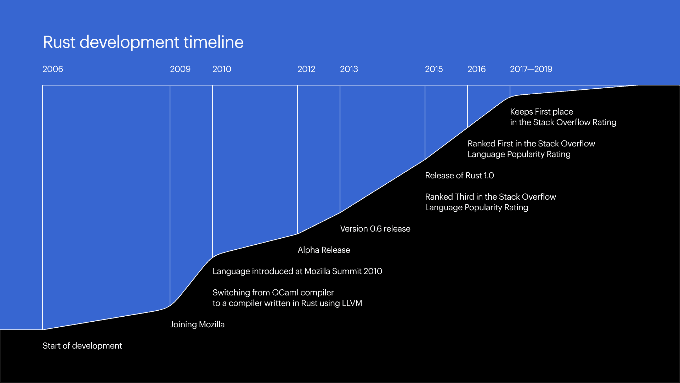Contents
Many programming languages from the 1960s, such as C++, are still being used for system programming despite the vulnerabilities that are left within the code, which are easy targets for attackers. These minor errors often lead to big exploitable flaws due to a lack of security checks.
Rust is a language that was first introduced in 2010 to overcome such problems using a modern approach. The main focus of this language is to pass your code through various safety checks before it is compiled and executed. Performance is another core attribute of Rust that makes it even more powerful.

The Rust’s ecosystem is well-organized to facilitate programmers, and it’s pretty easy to explore through numerous libraries on crates.io. If we look at Rust’s syntax, we find that it’s pretty similar to C++.
Overall, Rust is a good language, but its safety features are also frustrating for many programmers as they have to fix a lot of errors before they are able to run the program.
What Is Rust Programming Language Good for?
Like C++, Rust has numerous applications, but the problem is that competition is still there, therefore it will take time for Rust to climb the ladder. Still, here are a few uses:
1. Web Development
This is a major area where Rust is stepping up, with its outstanding frameworks like Actix Web and Rocket. Actix Web is more of a performance-oriented framework, while Rocket focuses on both security and performance.
We cannot really compare Rust with other high-level frameworks like Django and Rails yet due to how new Rust is. Many useful libraries are not yet introduced, which makes web development a bit complicated with Rust. There are some other languages for web development that are far ahead of Rust at the moment.
If you manage to overcome all the complexities, then Rust is completely worth it for web development due to its unmatchable security and performance. If your goal is to become a web developer, we highly recommend you check out these web development courses to get a better idea of other web frameworks.
2. Native Applications
Programmers often compare web and native apps with respect to their security and performance. It’s very difficult for web apps to compete with native applications, especially when it comes to responsiveness.
JavaScript is a major language for native applications, but it is not the only one; there are a few other native app development languages as well, such as C++.
Asm.js is a great way to merge and compile JavaScript and Rust code. Programmers can write a major part of their application in JavaScript, and they can use Rust code for performance-critical elements. It will make the app more secure and improve its performance.
Rust can help make your native apps more secure, but it still lags behind in actual native app development due to limited libraries.
The language is expanding gradually to eventually make native development possible, but it will take some time. However, you can obviously kickstart your career with native app development courses without needing Rust at all.
3. Game Development
Rust is a performance-oriented language, and it can carry out complex tasks efficiently with proper memory management.
Also, Rust does not use a garbage collector, which is a plus point for the most optimized gaming performance. There are numerous other game development languages that are doing better than Rust.
Unfortunately, Rust’s game development frameworks are still not that advanced to be able to compete with Unreal Engine.
The development processes are quite complicated because of very few relevant and strong libraries. If you are still interested in exploring more, then take directions from the Rust GameDev Subreddit.
It may still take a few years for Rust to become a considerable game development language. Until then, you can learn from these impressive game development courses to pursue your career goals.
4. Machine Learning
Rust is expected to thrive in Machine Learning (ML) due to its low-level memory control. The language uses high-level abstractions that are highly beneficial when constructing Rust-based neural networks. Rust carries a great potential to create modern algorithms, but it is still nowhere near other Machine Learning languages.
Programmers are currently experimenting with Rust, and the language still needs some time to mature enough for creating ML algorithms, just like we do in Python. New Rust libraries are being created to develop reliable neural networks, but it will take some time.
ML is an exciting and interesting domain that is developing speedily. If you do not want to miss out, then join these amazing Machine Learning courses to get started.
Advantages of Rust Programming Language

There is no doubt that Rust is a modern language that is still young. Here are a few reasons to learn it for a better programming future:
1. Minimized Memory Management Issues
Rust has no garbage collector running in the background, and it directly accesses memory and hardware; thus, it provides greater control over memory.
2. Cross-Platform Development Support
Rust is a reliable cross-platform language that works perfectly on Linux, macOS, and Windows operating systems. It has various frameworks available, which makes development easier.
3. Performance-Oriented Language
The language is much faster than Python and C++. Also, there is no garbage collection element which gives it a slight edge in speed.
4. Suggestions for Compile Errors
The Rust ecosystem provides you with valuable suggestions to prevent the most common compile errors that ultimately contribute to the debugging process.
5. Fairly Simple Syntax
The language uses TOML Syntax, which is easy to learn. Moreover, the language comes with a built-in package manager called Cargo. If you are eager to learn the basics, then start from these impressive Rust courses.
In Summary
Undoubtedly, Rust carries a lot of potential and it might replace some applications of C++ in the future but, currently, it is a young and immature language with limited libraries.
The language is constantly increasing in populararity among programmers, but Rust will certainly take time before it can compete with the top ten languages.